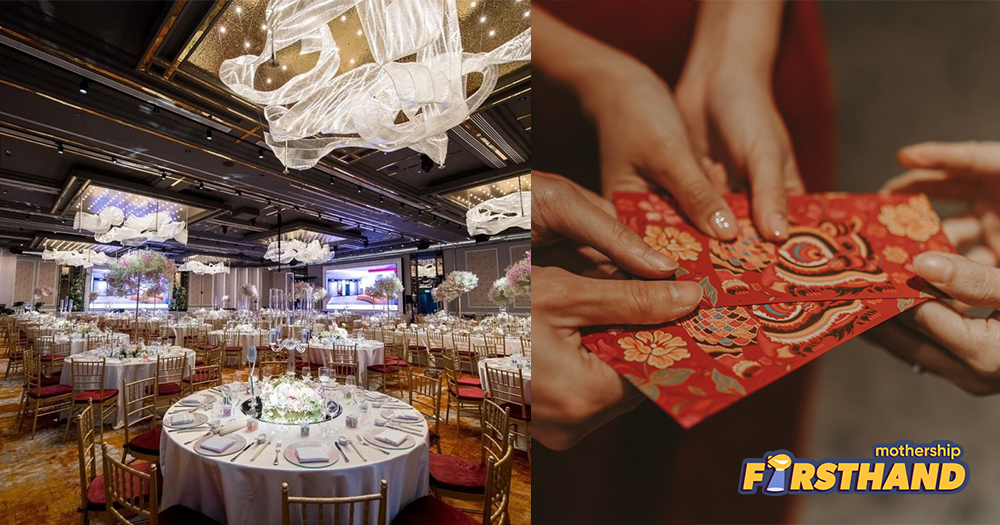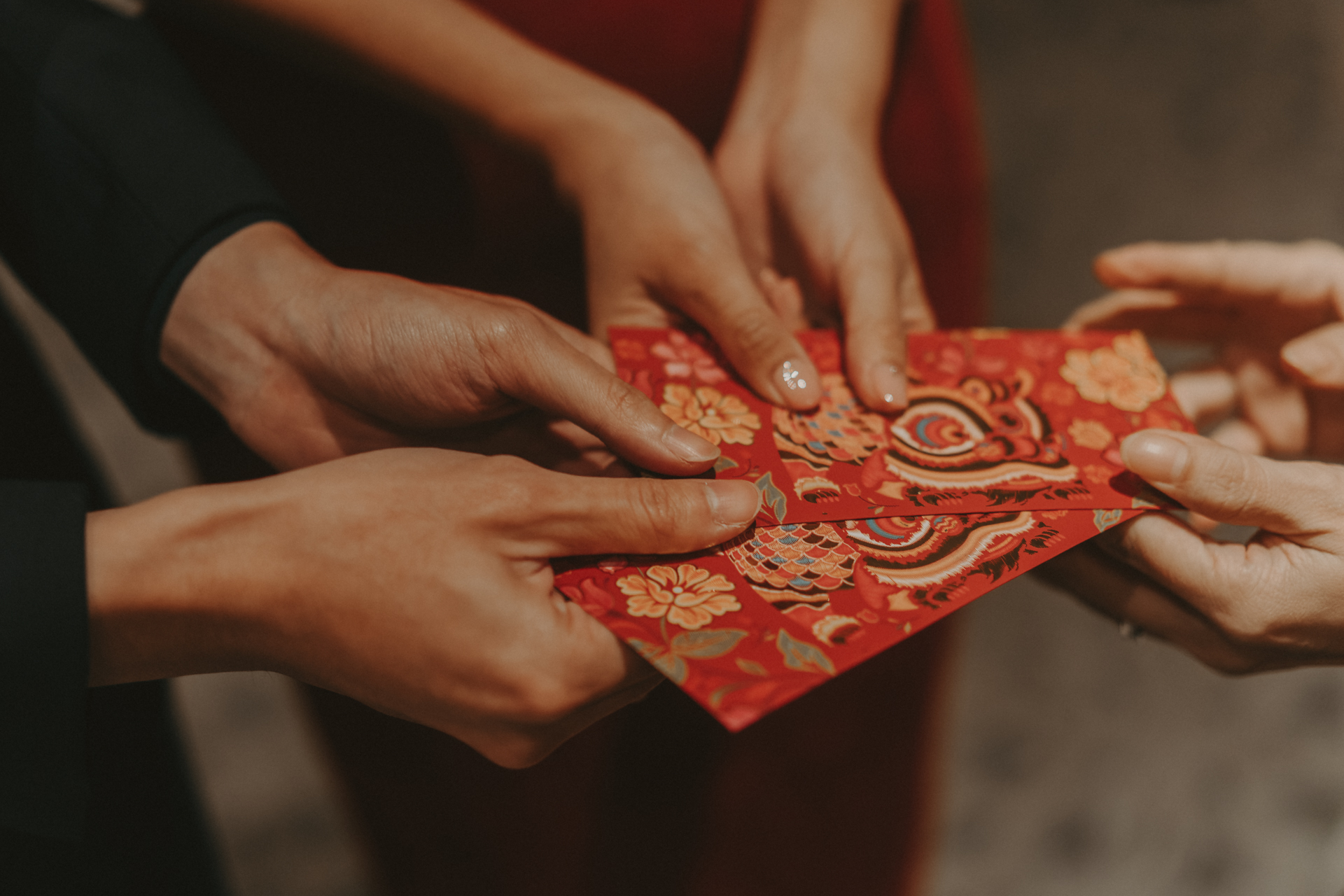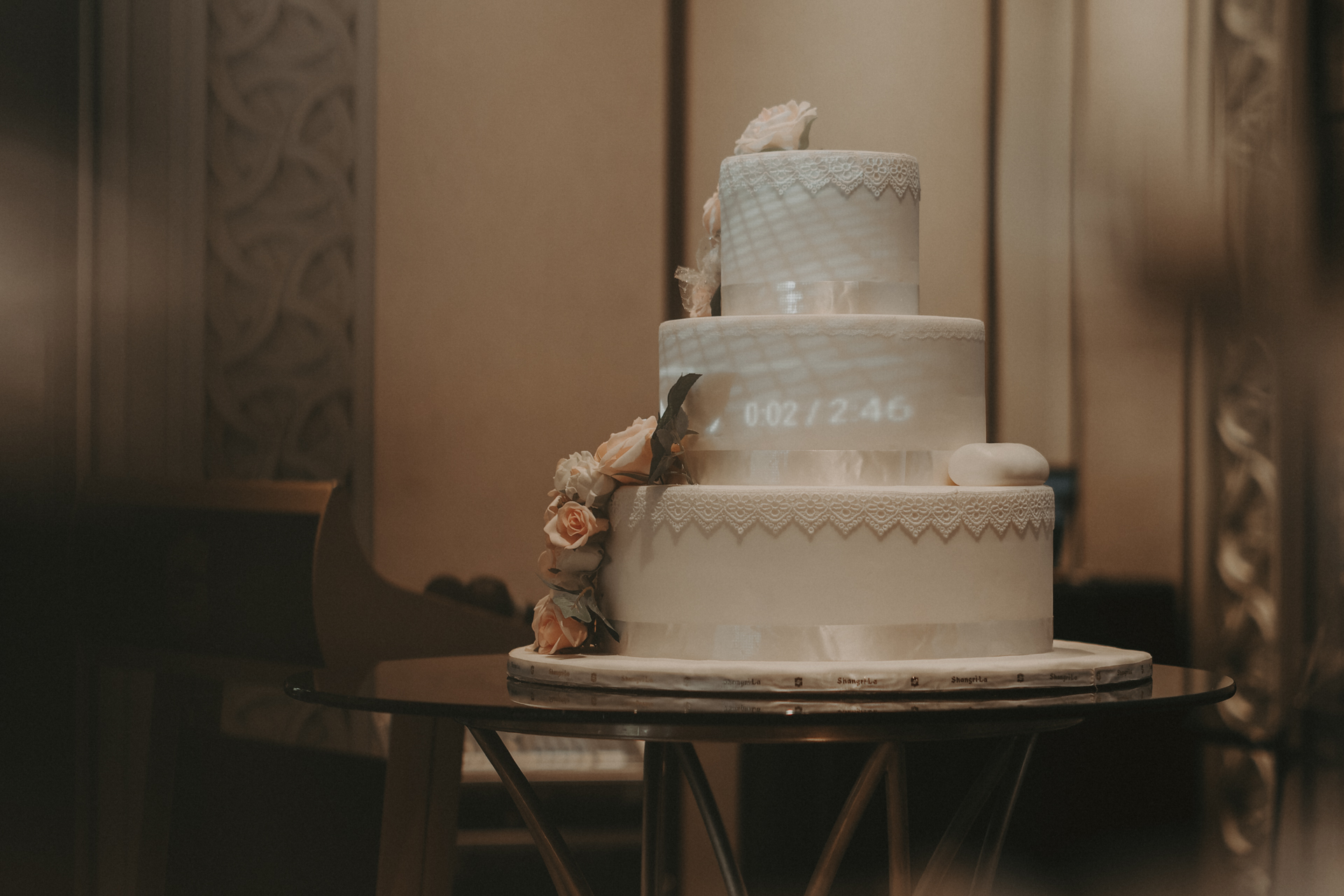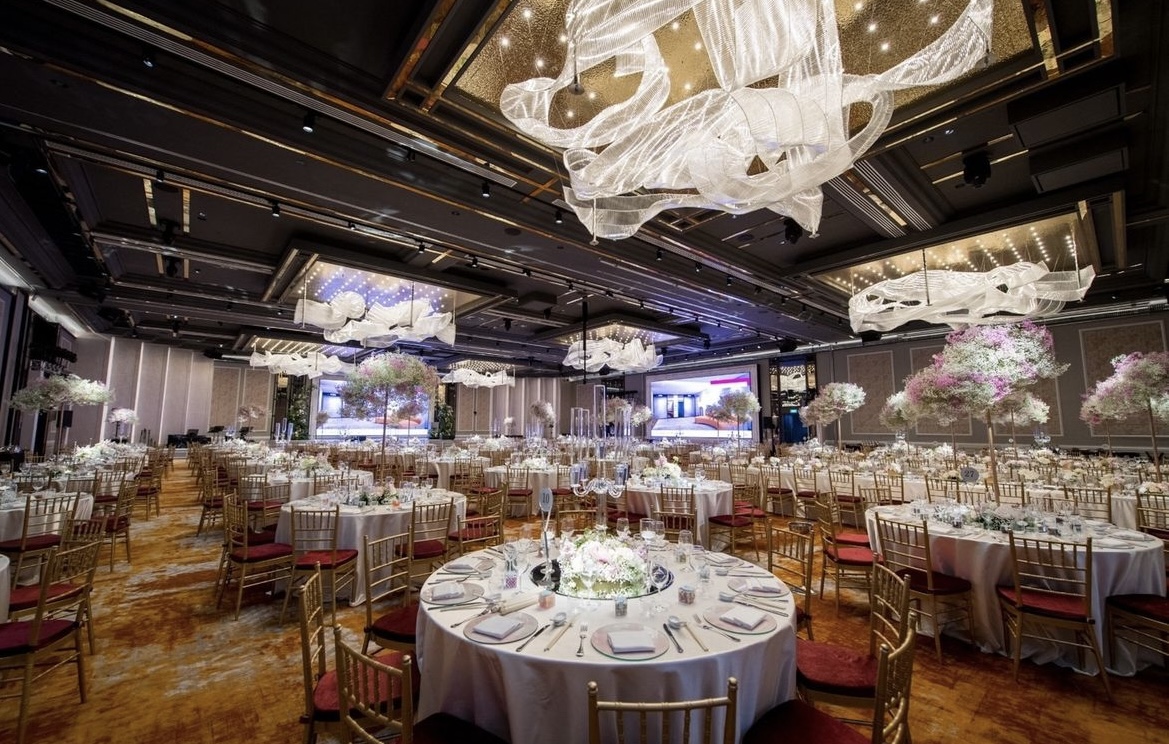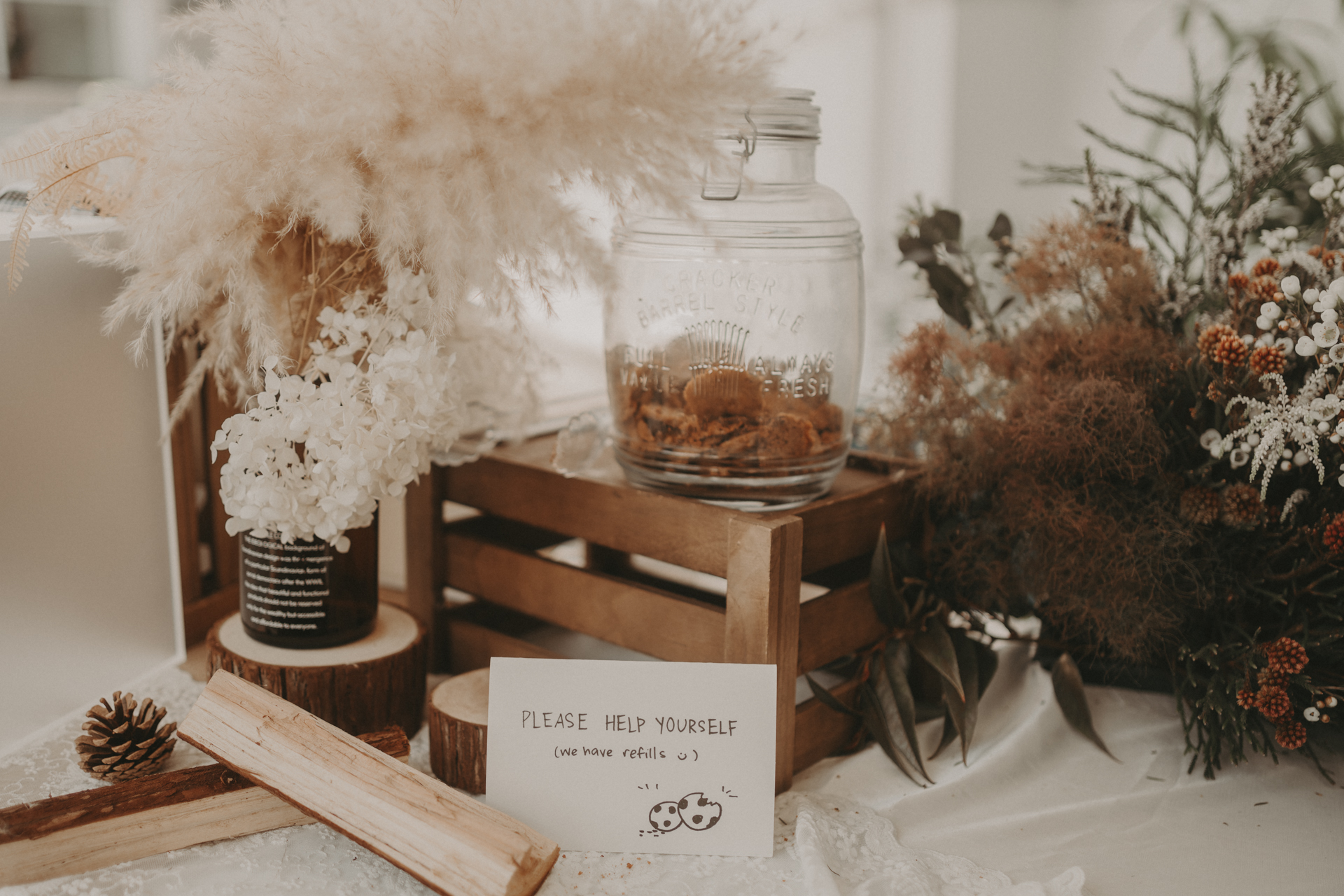Firsthand: Wedding angbaos shouldn't have to 'cover cost'. As a recent bride, here's why.
The most joyous — and expensive — event in a Singaporean's life.
Ilyda Chua |
December 23, 2023, 07:15 PM
There's been a lot of talk about wedding angbaos lately.
S$400 for a red packet may seem like an exception to the norm, like million-dollar HDB flats.
But it's indicative of a broader trend: angbao rates are rising to absurd levels.
Even a seat at comparatively modest four-star hotel can now easily cost close to S$200.
You can blame a lot of things. Rising cost of living, millennials being excessive, outdated societal norms, blah blah blah.
But the solution is easy: let's just ditch this paying-for-your-seat thing entirely.
Take it from me, as a recent bride.
Best intentions pave the way to hell
The practice stems from a place of the best intentions.
Weddings are events of celebration, and it's only expected to want to celebrate with gifts.
But they're also expensive affairs. Angbaos are the more pragmatic, collectivist version of the wedding gifts that our Western counterparts prefer: a way to step in and share the financial burden with our loved ones.
Unfortunately, they've evolved from a well-meaning gesture of good luck to a hot mess full of obligations and saving face.
Why? If you ask me, it's because they are — to put it bluntly — a bloody ridiculous expense.
There's only so far "good luck" can go before it becomes less a blessing and more a financial drain.
At an average of S$200 a seat (according to the 2024 forecast), the cost of attending a wedding with my husband will be S$400.
I just checked our shared calendar, and we have eight weddings scheduled for next year so far.
That's
S$3,200, guys. Enough for a holiday to Europe, a semester's worth of university tuition, or approximately 1,000 plates of caifan.
And it's not even the New Year yet.
Sorry I CMI
It's not just about the expense. Counting cents on your wedding angbaos also makes the whole thing grossly transactional.
Whenever I attend weddings, I end up stressing: how much do I have to give so that my friend won't hate me forever?
Will they think I'm a cheapskate if I undercut the holy grail that is SingaporeBrides' angbao rates guide?
Oh shit, what if they gave me a bigger angbao when they came to
my wedding?
It's come to the point that when money is tight, I end up turning down wedding invitations just to avoid the hassle, especially if I'm just attending as a plus-one.
Because, let's face the facts: according to prevailing societal convention, the wedding angbao isn't negotiable. It isn't a blessing or a gift — not anymore.
It is a
fee.
Hence this whole debacle.
So far, I haven't had to skip a close friend's wedding in the name of avoiding the S$200 fee yet.
But it's only a matter of time.
I'm not a radical. I'm not suggesting we ditch angbaos entirely.
But it shouldn't be a way for the couple to earn back, or worse, profit.
Planning for my wedding was, without doubt, one of the least fun experiences I've lived through. There are few things more stressful than doling out thousands of dollars for a one-day event.
Well-meaning relatives would tell me not to worry. To just spend first, and that I'd "earn back" from the angbaos I'd get.
But I had friends who were still in school. Friends with kids whose seats they'd have to pay for. Older relatives who are already retired.
How could I expect to earn from them? And should I even invite them, then, knowing they'd struggle to cover the cost of their seats?
Photo from Singaporebridesweddings/Instagram
After the wedding, the same relatives advised me to record the amounts I received in each angbao, so I could return the same amount if I attended their wedding someday.
More well-meaning advice, probably designed so I would avoid "shortchanging" them. And yet, I couldn't think of anything I wanted to do less.
Weren't angbaos supposed to be a gift?
Why would that be dependent on the value of the gift they gave me?
It was all hugely stressful, and made an already unnecessarily transactional event feel even more so.
Weddings are too expensive
But maybe the problem is larger than just angbaos.
After all, the reason for the ill pressure is — in the first place — because the average Chinese Singaporean wedding costs
so damn much.
There's much to love about being at the crossroads of the East and West. We get access to both ASOS and Taobao. We celebrate both Christmas and Chinese New Year.
But when it comes to weddings, adopting the most expensive conventions of two cultures is frankly stupid.
Why do we need
both the banquet and tea ceremony from our Chinese roots, as well as all the decorative excess of the West?
Why do we need
both the cheongsam and the fancy white gown?
Both the
guodali and the multilayered wedding cake?
When did it become a thing for the Singaporean wedding to become a dual-culture affair?
Let's not depend on angbaos
As a recent bride, I won't lie.
The angbaos from my friends and relatives — under the heavy hand of societal pressure — really did go a long way in helping me pay for my wedding. For that, I'm grateful.
But it was still far more money than I, a typical working adult, had any right to spend.
Let alone expect other people to pay for.
I spoke to a few friends who also recently got married, and it seems clear: times are changing, and weddings are getting too expensive.
Joni, who was married earlier this year, took the courageous step of forgoing a banquet entirely, holding just a small ceremony with simple buffet catering.
"[A wedding banquet] is very expensive and I feel like in these times, it's financially not prudent for us and everyone involved. Even if they give angbao."
And as for Angela, 27, while she opted for the works, she didn't expect her angbaos to pay for the wedding.
Despite being told to expect a profit, she nevertheless planned for a 30 per cent loss.
"Can’t expect people to help us cover wedding costs when we’re the ones who want to hold a banquet in the first place!" she quipped.
After all, there's only so far the Asian collectivist spirit should go.
Yes, marriage is a public institution. There's a theory that weddings make up part of the sunk psychological and financial costs of a union that deters people from going through these motions too easily.
As such, having family and friends put down time and money would go some way in making sure a couple that vows to stay together, fulfils that obligation through thick and thin.
But alas, that's not always the case.
I once attended a wedding, gave a S$200 angbao, only to see the husband and wife split up six months later — effectively debunking the idea that there is pressure in staying together having undergone a public, communal event together as a couple.
Also, I was really salty for months after. Let's just say I won't be attending that friend's next wedding.
The real gift
I'm not rich and whimsical enough to spout feel-good platitudes like "the real gift is your presence", or "it's the thought that counts".
The truth is, cash helps. Angbaos are
great.
But that's all they should be: help.
An expression of good luck, or blessing, or just simple familial joy.
But fancy weddings are
not a necessity. They're a luxury, a privilege, and it shouldn't be the responsibility of friends and family to pay for something like that.
So let's make angbaos great again. (Gifts, not admission fees.)
Let's make weddings great again. (Parties, not profit-maximising ventures.)
And, for God's sake, let's forget about those f**king angbao rate guides.
Top image from SingaporeBrides/Instagram and Ilyda Chua
If you like what you read, follow us on
Facebook,
Instagram,
Twitter and
Telegram to get the latest updates.
You Might Also Like









